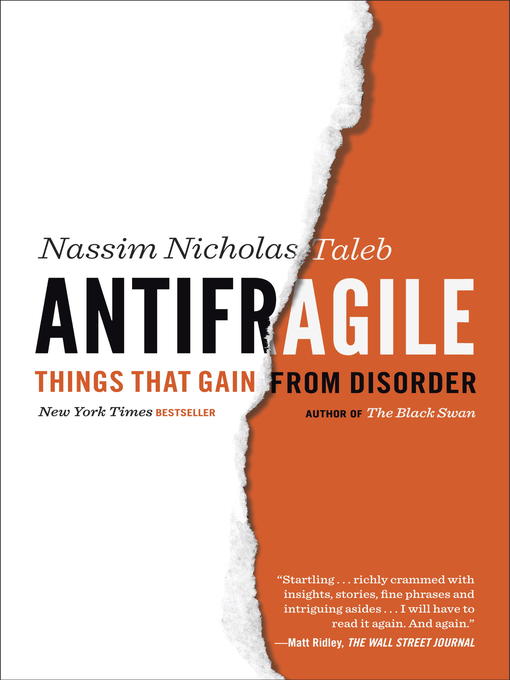
Antifragile
Things That Gain from Disorder
کتاب های مرتبط
- اطلاعات
- نقد و بررسی
- دیدگاه کاربران
نقد و بررسی

October 15, 2012
In this overstuffed, idiosyncratic theory of everything we don’t know, financial adviser and epistemologist Taleb amplifies his megaselling The Black Swan with further musings on the upside of unpredictable upheavals. Ranging haphazardly across probability theory, classical philosophy, government, medicine, and other topics, he contrasts large, complex, “fragile” systems that try to minimize risk but collapse under unforeseen volatility with small, untethered, “antifragile” systems structured to reap advantages from disorder. Taleb’s accessible, stimulating exposition of these ideas yields cogent insights, particularly in finance—his specialty. (He essentially inflates a hedging strategy into a philosophy of life.) Often, however, his far-flung polymathic digressions on everything from weight-lifting regimens to the Fukushima meltdown or the unnaturalness of toothpaste feel tossed-off and unconvincing, given his dilettantish contempt for expert “knowledge-shknowledge.” Taleb’s vigorous, blustery prose drips with Nietzschean scorn for academics, bankers, and bourgeois “sissies” who crave comfort and moderation: “If you take risks and face your fate with dignity,” he intones, “insults by half-men (small men, those who don’t risk)” are no more rankling than “barks by non-human animals.” More worldview than rigorous argument, Taleb’s ramblings may strike readers with knowledge-shknowledge as ill-considered; still, he presents a rich—and often telling—critique of modern civilization’s obsession with security. Illus. Agent: John Brockman, Brockman Inc.

February 1, 2013
Engineer and trend-watcher Taleb builds on his best-selling hit The Black Swan (2007) to limn a world of uncertainty and chaos. The world is a fragile place, full of surprises. Humans--and especially their markets--hate surprises in general. Small wonder, then, that we spend so much effort trying to make our buildings earthquake-proof and our computers virus-proof, that things prophylactic (no, not that) occupy so much of our thoughts. Taleb calls this "antifragility," writing, "Just as we cannot improve health without reducing disease, or increase wealth without first decreasing losses, antifragility and fragility are degrees on a spectrum." This being a book meant to solve big-picture problems that may or may not be real for most readers, Taleb urges that many of our efforts are misguided, if understandable. He scorns the "fragilistas" so afraid of their own shadows that they put systems into place "in which the benefits are small and visible, and the side effects potentially severe and invisible." His current tract is meant as a corrective, and it's mostly successful at what it aims to do, if sometimes a little daunting--readers are asked, for instance, to grapple with terms such as "apophatic," "hormesis" and "Mithridatization," all useful but thorny all the same. In what a college comp instructor might mark as a shift in diction, however, he throws in more familiar language: "Redundancy is not necessarily wussy; it can be extremely aggressive." And good thing, too. Touring the landscape of uncertainty, Taleb conjures up a few first principles and praises a few models, not least of them Seneca, the great Stoic philosopher who also "happened to be the wealthiest person in the Roman Empire." Mostly, though, the book is an accumulation of small examples and counterexamples, more suggestive than prescriptive. A stimulating modern rejoinder to Joseph Schumpeter's notion of creative destruction.
COPYRIGHT(2013) Kirkus Reviews, ALL RIGHTS RESERVED.

Starred review from January 1, 2013
Taleb's (risk engineering, New York Univ.; Black Swans) unorthodox thinking and luminescent style manifest themselves in a fusillade of neologisms, creative phraseology, and quirky illustrations. In his previous work, the author outlined the impact of rare, unpredictable events and foretold the impending financial crisis. Here he uses the concept of "antifragility" to show how we can protect ourselves from inevitable personal and societal calamities. The global financial crisis of 2008 is the watershed event of the narrative. Yet Taleb adroitly weaves in strands of psychology, child development, medicine, biology, civics, philosophy, education, military strategy, and the classics to explain how antifragility can make people and systems stronger in the same way that bones need stress to grow denser. VERDICT Taleb's tome is by turns entertaining, thought-provoking, silly, brilliant, and irreverent, yet his logic remains cogent and his message clear throughout. His wit and substance have already found him a worldwide audience; this book is likely to create him an even more robust fan base.--Carol Elsen, Univ. of Wisconsin, Whitewater, Libs.
Copyright 2013 Library Journal, LLC Used with permission.

November 15, 2012
Judging by his anecdotes, Taleb interacts with the economic masters of the universe as he jets from New York to London or attends business-politics confabs in Davos, Switzerland. Anything but awed by them, Taleb regards them as charlatans, not as credible experts. Such skepticism toward elites, which imbued Taleb's The Black Swan: The Impact of the Highly Improbable (2007), continues in this work, which grapples with a concept Taleb coins as antifragile. Not readily reducible to a definition (Taleb takes the whole book to develop the idea), suffice to say here that antifragile's oppositeseconomic, political, or medical systems that are vulnerable to sudden collapsetend to be managed by highly educated people who think they know how systems work. But they don't, avers Taleb. Their confidence in control is illusory; their actions harm rather than help. In contrast, Taleb views decentralized systemsthe entrepreneurial business rather than the bureaucratized corporation, the local rather than the central governmentas more adaptable to systemic stresses. Emphatic in his style and convictions, Taleb grabs readers given to musing how the world works.(Reprinted with permission of Booklist, copyright 2012, American Library Association.)

























دیدگاه کاربران